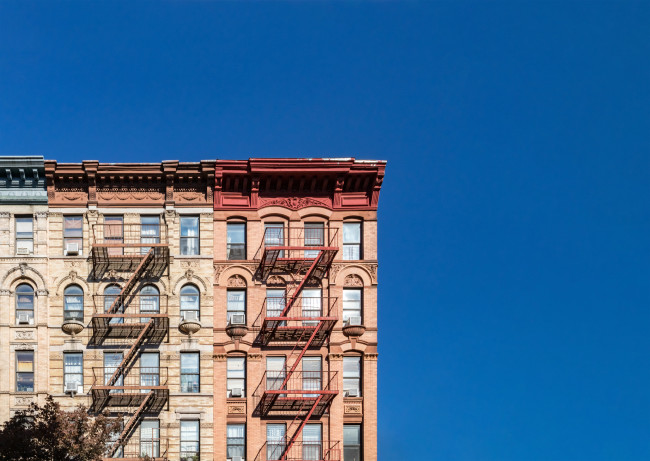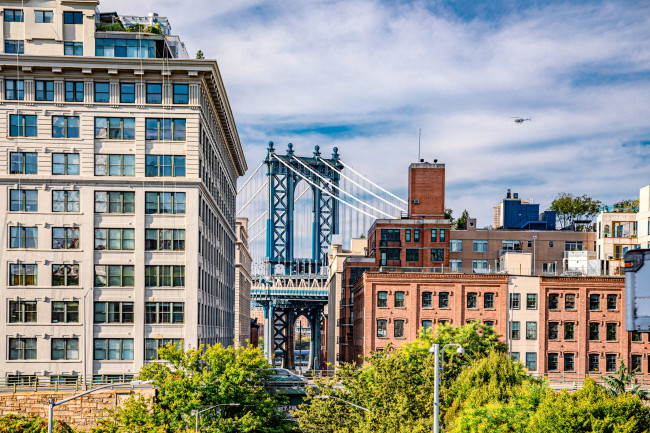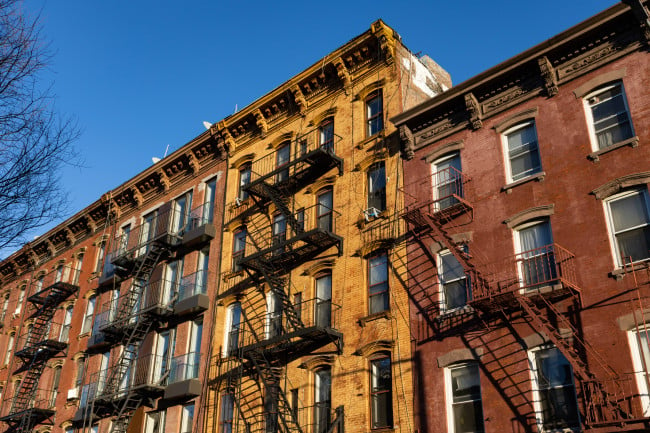Good Cause FAQ: 10 questions and answers about NYC's new eviction law
- The new law gives renters more protections from high rent increases and eviction
- It applies to tenants in certain market-rate units, not rent-stabilized apartments
- Your landlord is required to notify you if you’re covered starting in August

If you got a lease renewal with a double-digit rent increase, you should see if Good Cause eviction applies to you.
iStock
Head’s up New York City renters: You might be entitled to a lower rent increase this year under the state’s recently passed Good Cause eviction law. But if you’re confused about what that law means, you’re not alone.
Advocacy groups, legal services organizations, and tenant attorneys have been peppered with questions in the past few months about Good Cause eviction, a new law that requires landlords to justify not renewing a tenant’s lease and gives renters a way to challenge “unreasonable” rent increases in court.
“Most of the questions we get are just something along the lines of: ‘What is this good cause thing?’” said Michael Grinthal, director of housing rights for the nonprofit Take Root Justice. “And a lot of people that we talk to are confused about how to enforce their rights under good cause.”
The confusion is understandable because Good Cause has many caveats and legalese that can be difficult to understand.
Jennifer Rozen, managing attorney at the Rozen Law Group, says she’s received questions every day from renters looking to understand the law to fight double-digit rent increases.
Similarly, Met Council on Housing logged 56 calls from tenants since the law passed in April, and is expecting more, said Andrea Shaprio, director of programs and advocacy for the tenant’s rights organization the council.
If you want to know how to use this law to fight a high rent increase, read on.
1. What is Good Cause eviction?
Good Cause eviction is sort of what it sounds like—a landlord needs a good reason to evict you, such as if you broke the law or violated your lease. It also means your landlord has to justify rent increases above a certain threshold pegged to inflation, 8.82 percent this year.
These new rights are a huge boon for tenants, because it gives them the power to negotiate a lower rent increase directly with their landlord. But if you and your landlord can’t come to an agreement, the way you enforce your Good Cause protections is through the city’s housing court system.
There’s no city or state agency charged with enforcing Good Cause, which applies to market-rate apartments only. (For rent-stabilized apartments, tenants can file an overcharge complaint with the Division of Housing and Community Renewal.) It’s up to you to advocate for your rights under Good Cause, either at the negotiating table or in the courts.
2. Am I covered under Good Cause eviction protections?
There are a lot of carve outs for the Good Cause eviction law, for example buildings constructed after 2009, landlords who own less than 10 units, and tenants who already pay a significant monthly rent bill.
You can check to see if you’re covered by searching your address on openigloo, but it’s worth doing your own research since openigloo won’t identify if you’re exempt because you pay too much in rent (more than $5,846 for a studio).
Check out Brick Underground’s best advice, “How to tell if your NYC apartment building is protected by the new Good Cause eviction law” to find out if you’re covered.
3. My landlord says Good Cause eviction protections don’t kick in until August—is that true?
No—Good Cause eviction applies to all of New York City as of April 20th, when legislators passed the protections as part of the state budget.
However, your landlord doesn’t have to notify you if you’re covered until Aug. 18th, according to the city.
4. Does my landlord have to tell me if I’m covered under Good Cause?
Yes, but not quite yet. Landlords are obligated to tell tenants whether Good Cause eviction applies to them in August. That notice should contain if the apartment is subject to Good Cause Eviction, or why it is not.
If your landlord decides not to renew your lease, they have to provide a reason if your building is covered under Good Cause, according to the law.
And if your landlord fails to provide a “timely” notice, the law states that your existing lease would carry on (unless your lease says otherwise).
So keep an eye out for a rider at the end of your lease if you renew your apartment after August 20th, said Cea Weaver, coalition director for Housing Justice for All. It should be titled something like, “Notice to tenant of applicability or inapplicability of the New York state Good Cause Eviction law,” according to the law.
5. Am I protected under Good Cause if I don’t have a lease?
Yes—Good Cause eviction applies to renters even if you just have a verbal agreement instead of a lease. (But squatters are exempt from Good Cause eviction protections.)
6. Can my landlord raise my rent by more than 8.82 percent if I’m covered by Good Cause?
Yes, in certain circumstances. The law states that tenants have a right to challenge “unreasonable” rent increases. This year, an unreasonable rent increase is one above 8.82 percent.
But in court, a judge can decide that a higher rent bill is reasonable if the landlord’s costs have risen.
For example, a court could find that a landlord can raise your rent higher if they completed significant repairs to the building—such as a substantial modification or replacement of an electrical, plumbing, or mechanical system, or the removal of hazardous materials like lead paint.
7. How do I enforce my rights to a reasonable rent increase under Good Cause?
Your first step should be to try to negotiate a lower rent increase with your landlord. Nobody wants to go to housing court, so it’s best to talk to them first.
Contact your landlord and reference the law when asking for a lower rent increase, or better yet, do so with a group of tenants so you’re not negotiating alone, Weaver said. Make sure to check out Brick’s best advice on negotiating here: “How to use New York’s Good Cause eviction law to negotiate a smaller rent increase.”
If that fails, housing court would be your next step—but that’s not a decision you should make lightly. There is a risk your landlord could successfully argue that they need to raise your rent above 8.82 percent. Talk to an attorney or a tenant organization before you make that call.
If you do decide to move forward, you can continue to pay rent to your landlord excluding the rent increase, and wait for your landlord to initiate a nonpayment case against you. Then, you’ll argue in front of a judge that you’re entitled to a lower rent increase under Good Cause.
During that process, you’ll also get more insight into who owns your building. Your landlord would have to share the names of the actual people who have a direct or indirect ownership interest in the company that owns your apartment building—often an obscure LLC. Otherwise, your landlord cannot claim to be a small landlord and exempt from the law, according to the law’s text.
8. Can I use Good Cause to renegotiate a high rent increase for a lease renewal I’ve already signed?
You can certainly try. If you signed a renewal agreement with a rent increase above 8.82 percent after April 20th—when the law went into effect—you can still argue you’re entitled to a lower rent increase, said Ellen Davidson, a staff attorney at the Legal Aid Society.
That’s because the law specifically states that any agreement “waiving or modifying” your rights under Good Cause is considered “void as contrary to public policy.”
“If you signed a renewal lease offer after April 20th, the fact that you signed that lease renewal doesn't stop you from being able to argue in court in a non-payment case that the rent increase is not reasonable,” Davidson said.
But it’s likely you’d end up in court in that scenario, she added.
“It’s hard for me to imagine that there would be a landlord out there who got a tenant to sign an unreasonable rent increase who is going to go back on it,” Davidson said. “But it may be worth saying let's not have this end up in court because if it ends up in court, you're going to have to justify this rent increase.”
9. My building used to be rent-stabilized under a 421-a tax abatement, but now it’s market-rate. Am I covered under Good Cause?
Even if your building was previously rent-stabilized, it can be covered under Good Cause eviction. But your landlord may still fight for a rent increase.
Your landlord may argue that they need to raise your rent more than that 8.82 percent. Your landlord could argue that because their tax abatement has expired, their costs are going up and that justifies a higher rent increase. Whether that argument is successful will depend on the situation, Rozen said.
“I think it's largely going to depend on the very specific facts and circumstances surrounding the building, what their finances are, and what the rents are,” Rozen said.
10. My landlord wants to hike my rent and won’t negotiate. Who can I talk to for help?
Talk to your fellow tenants,Weaver said. Negotiating as a group will give you more leverage to ask for a lower rent increase.
You can also call 311 and ask for the tenant helpline, call the Met Council on Housing’s tenant’s rights hotline at 212-979-0611, or your local tenants union for advice.
If you can afford one, it’s worth talking to a tenant attorney, said Rosalind Black, citywide housing director for Legal Services NYC.
“For tenants, the most important thing is being able to consult with legal counsel on these issues, because they are complicated, and it's not going to be readily apparent to most tenants whether they're covered by the law and whether the rent increases are permissible,” Black said.




























